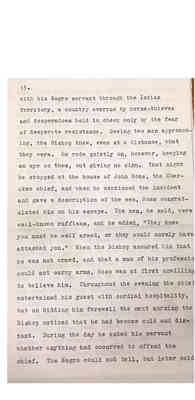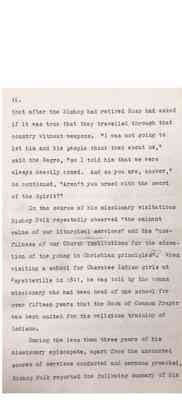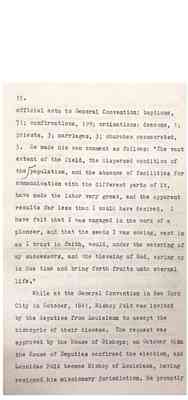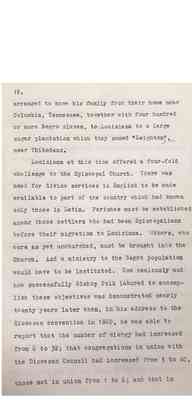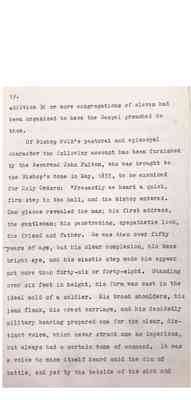Pages
16
-15-
with his Negro servant through the Indian Territory, a country overrun by horse-thieves and desperadoes held in check only by the fear of desperate resistance. Seeing two men approaching, the Bishop knew, even at a distance, what they were. He rode quietly on, however, keeping an eye on them, but giving no sign. That night he stopped at the house of John Ross, the Cherokee Chief, and when he mentioned the incident and gave a description of the men, Ross congratulated him on his escape. The men, he said, were well-known ruffians, and he added, "They knew you must be well armed, or they would surely have attacked you." When the Bishop assured him that he was not armed, and that a man of his profession could not carry arms, Ross was at first unwilling to believe him. Throughout the evening the chief entertained his guest with cordial hospitality, but on bidding him farewell the next morning the Bishop noticed that he had become cold and distant. During the day he asked his servant whether anything had occurred to offend the chief. The Negro could not tell, but later said
17
-16-
that after the Bishop had retired Ross had asked if it was true that they travelled through that country without weapons. "I was not going to let him and his people think that about us," said the Negro, "so I told him that we were always heavily armed. And so you are, master," he continued, "Aren't you armed with the sword of the Spirit?"
In the course of his missionary visitations Bishop Polk repeatedly observed "the eminent value of our liturgical services" and the "usefulness of our Church institutions for the education of the young is Christian principles". When visiting a school for Cherokee Indian girls at Fayetteville in 1841, he was told by the woman missionary who had been head of the school for over fifteen years that the Book of Common Prayer was best suited for the religious training of Indians.
During the less than three years of his missionary episcopate, apart from the uncounted scores of services conducted and sermons preached, Bishop Polk reported the following summary of his
18
-17-
official acts to General Convention: baptisms, 71; confirmations, 199; ordinations: deacons, 1; priests, 3; marriages, 3; churches consecrated, 5. He made his own comment as follows: "The vast extent of the field, the dispersed condition of the population, and the absence of facilities for communication with the different parts of it, have made the labor very great, and the apparent results far less than I could have desired. I have felt that I was engaged in the work of a pioneer, and that the seeds I was sowing, cast in as I trust in faith, would, under the watering of my successors, and the blessing of God, spring up in due time and bring forth fruits unto eternal life."
While at the General Convention in New York City in October, 1841, Bishop Polk was invited by the deputies from Louisiana to accept the bishopric of their diocese. The request was approved by the House of Bishops; on October 16 the House of Deputies confirmed the election, and Leonidas Polk became Bishop of Louisiana, having resigned his missionary jurisdiction. He promptly
19
-18-
arranged to move his family from their home near Columbia, Tennessee, together with four hundred or more Negro slaves, to Louisiana to a large sugar plantation which they named "Leighton," near Thibodaux.
Louisiana at this time offered a four-fold challenge to the Episcopal Church. There was need for divine services in English to be made available in part of the country which had known only those in Latin. Parishes must be established among those settlers who had been Episcopalians before their migration to Louisiana. Others, who were as yet unchurched, must be brought into the Church. And a ministry to the Negro population would have to be instituted. How zealously and how successfully Bishop Polk labored to accomplish these objectives was demonstrated nearly twenty years later when, in his address to the diocesan convention in 1860, he was able to report that the number of clergy had increased from 6 to 32; that congregations in union with the Diocesan Council had increased from 3 to 40, those not in union from 1 to 6; and that in
20
-19-
addition 30 or more congregations of slaves had been organized to have the Gospel preached to them.
Of Bishop Polk's pastoral and episcopal character the following account has been furnished by the Reverend John Fulton, who was brought to the Bishop's home in May, 1857, to be examined for Holy Orders: "Presently we heard a quick, firm step in the hall, and the bishop entered. One glance revealed the man; his first address, the gentleman; his penetrating, sympathetic look, the friend and father. He was then over fifty years of age, but his clear complexion, his keen bright eye, and his elastic step made him appear not more than forty-six or forty-eight. Standing over six feet in height, his form was cast in the ideal mold of a soldier. His broad shoulders, his lean flank, his erect carriage, and his decidedly military bearing prepared one for the clear, distinct voice, which never struck one as imperious, but always had a certain tone of command. It was a voice to make itself heard amid the din of battle, and yet by the bedside of the sick and
